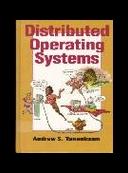Книга: Distributed operating systems
4.7. SUMMARY
4.7. SUMMARY
Although threads are not an inherent feature of distributed operating systems, most of them have a threads package, so we have studied them in this chapter. A thread is a kind of lightweight process that shares an address space with one or more other threads. Each thread has its own program counter and stack and is scheduled independently of the other threads. When a thread makes a blocking system call, the other threads in the same address space are not affected. Threads packages can be implemented in either user space or by the kernel, but there are problems to be solved either way. The use of lightweight threads has led to some interesting results in lightweight RPC as well. Pop-up threads are also an important technique.
Two models of organizing the processors are commonly used: the workstation model and the processor pool model. In the former, each user has his own workstation, sometimes with the ability to run processes on idle workstations. In the latter, the entire computing facility is a shared resource. Processors are then allocated dynamically to users as needed and returned to the pool when the work is done. Hybrid models are also possible.
Given a collection of processors, some algorithm is needed for assigning processes to processors. Such algorithms can be deterministic or heuristic, centralized or distributed, optimal or suboptimal, local or global, and sender-initiated or receiver-initiated.
Although processes are normally scheduled independently, using co-scheduling, to make sure that processes that must communicate are running at the same time, performance can be improved.
Fault tolerance is important in many distributed systems. It can be achieved using triple modular redundancy, active replication, or primary-backup replication. The two-army problem cannot be solved in the presence of unreliable communication, but the Byzantine generals problem can be solved if more than two-thirds of the processors are nonfaulty.
Finally, real-time distributed systems are also important. They come in two varieties: soft real time and hard real time. Event-triggered systems are interrupt driven, whereas time-triggered systems sample the external devices at fixed intervals. Real-time communication must use predictable protocols, such as token rings or TDMA. Both dynamic and static scheduling of tasks is possible. Dynamic scheduling happens at run time; static scheduling happens in advance.




